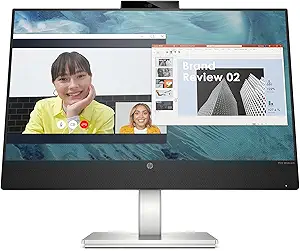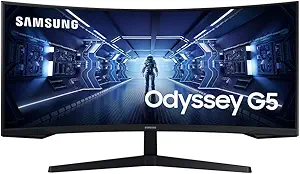In the vast landscape of monitor options, two formidable contenders, HP and Samsung, vie for dominance, each bringing its own arsenal of features and innovations to the table. As consumers, navigating through this sea of choices can be daunting. Therefore, let's embark on a journey to explore the strengths and distinctions of HP and Samsung monitors, aiding you in making an informed decision tailored to your needs and preferences.
Key Features Comparison
Size
Samsung and HP are both highly reputable brands in the monitor market, each offering a range of sizes to suit various user needs. Samsung monitors are known for their wide variety of sizes, ranging from compact 24-inch screens to expansive 49-inch ultra-wide displays. Their latest offering, the Samsung Odyssey G9, boasts a massive 49-inch screen size with a 32:9 aspect ratio, providing an immersive gaming and viewing experience. However, the large size may not be suitable for all desktop setups and could potentially lead to a cluttered workspace. On the other hand, HP monitors typically range from 21.5 inches to 34 inches. Their largest model, the HP Z34c, features a 34-inch ultra-wide curved display, which is smaller compared to Samsung's largest. This size is still quite substantial and provides ample screen real estate for multitasking and immersive gaming. The smaller size range of HP monitors may be more suitable for users with limited desk space or those who prefer a more traditional desktop setup. However, users looking for the most immersive experience may find the size offerings from HP somewhat limiting compared to Samsung.
Response Time
Samsung monitors are known for their impressive response times, which is a crucial factor for gamers and graphic designers. Most Samsung monitors, such as the Samsung Odyssey G7, boast a 1ms response time, which is currently the fastest available in the market. This means that images transition quickly and smoothly, reducing ghosting and motion blur. Samsung uses the latest Quantum Dot technology, which enhances the response time and provides vibrant colors and sharper contrasts. However, some users have reported slight flickering issues with Samsung monitors, which could be a downside for some users. On the other hand, HP monitors, like the HP Omen X 27, also offer a 1ms response time, providing a smooth visual experience. HP uses the latest Nano IPS technology, which ensures fast response times while delivering accurate colors and wide viewing angles. However, some users have reported that HP monitors' fast response times can sometimes come at the cost of color accuracy, especially in darker scenes. In comparison to other brands, both Samsung and HP monitors offer competitive response times, making them suitable for fast-paced gaming and professional design work. However, the choice between the two may come down to personal preference and specific needs, such as color accuracy or viewing angles.
Panel Type
Samsung monitors often use VA (Vertical Alignment) and Super AMOLED panels in their high-end models. The VA panels offer a good balance between TN (Twisted Nematic) and IPS (In-Plane Switching) panels, providing better color reproduction and viewing angles than TN panels and faster response times than IPS panels. Super AMOLED technology, on the other hand, is renowned for its exceptional color accuracy, deep blacks, and energy efficiency. However, Samsung monitors with these panels can be relatively expensive. Also, VA panels might exhibit ghosting in fast-paced games due to slower response times compared to TN panels. In contrast, HP monitors predominantly use IPS panels. IPS panels are known for their superior color accuracy and consistency, as well as wide viewing angles, making them ideal for tasks that require color precision like graphic design and photo editing. HP also has monitors with TN panels, which are cheaper and offer faster response times, making them suitable for gaming. However, they have poorer color reproduction and narrower viewing angles compared to IPS and VA panels. Compared to Samsung, HP monitors might not offer the same level of contrast and vibrant colors, especially those seen in Super AMOLED displays. However, they generally offer better color consistency across the screen and are more affordable.
Affordability
When it comes to the aspect of price, Samsung and HP monitors offer a wide range of options to cater to various budget requirements. Samsung monitors, known for their innovative technologies like Quantum Dot and High Dynamic Range (HDR), tend to be priced slightly higher. For instance, their top-tier models like the Samsung Odyssey G9, with its cutting-edge features such as 240Hz refresh rate, 1ms response time, and 5120x1440 resolution, command a premium price. However, Samsung also offers more affordable options in their lineup, like the Samsung C24F390, which is a curved monitor that still offers decent specs at a much lower price point. On the other hand, HP monitors are generally more affordable and cater to a more budget-conscious market. They offer a balance between price and performance, with their monitors like the HP VH240a and HP Pavilion 22cwa being popular choices among consumers for their affordability and decent performance. While they may not have the high-end features that Samsung's top-tier models offer, HP monitors are still equipped with the latest technologies like IPS panels and low blue light filters. However, it's worth noting that HP does have premium offerings like the HP Omen X 27, a gaming monitor with a 240Hz refresh rate and 1ms response time, but these are priced competitively and are often cheaper than their Samsung counterparts.
Reputation
Samsung and HP are two of the most reputable brands in the monitor market. Samsung, known for its cutting-edge technology, has a reputation for delivering high-quality monitors that offer excellent resolution, vibrant colors, and sharp images. Their latest Quantum Dot technology and High Dynamic Range (HDR) features have been highly appreciated by users. However, some users have reported issues with the durability of Samsung monitors, which may affect the brand's reputation in terms of product longevity. On the other hand, HP has built a solid reputation for producing reliable and durable monitors. Their monitors are known for their ergonomic design, energy efficiency, and excellent customer service. HP's latest monitors come with features like low blue light mode and anti-glare screens, which are beneficial for users who spend long hours in front of the screen. However, compared to Samsung, HP monitors sometimes fall short in delivering the same level of vibrant colors and sharpness. In comparison to other brands, both Samsung and HP hold strong positions in the market, but Samsung's reputation for advanced technology and HP's reputation for reliability make them unique in their own ways.
Picture Quality
When it comes to picture quality, both Samsung and HP monitors offer a range of options that cater to different user needs. Samsung monitors are known for their Quantum Dot technology, which delivers more than a billion shades of brilliant color and 100% color volume for exceptional depth of detail. This technology is particularly beneficial for graphic designers and video editors who require accurate color representation. Samsung also offers monitors with High Dynamic Range (HDR) which provides a wider range of colors and greater contrast between blacks and whites, offering a more realistic and vibrant viewing experience. On the other hand, HP monitors are known for their IPS (In-Plane Switching) technology, which provides consistent, accurate color from all viewing angles, unlike standard TN panels which can have color shifting when viewed from the side. HP also offers monitors with a 4K resolution, providing a highly detailed and sharp image. However, while HP monitors offer excellent picture quality, they may not reach the same level of color depth and vibrancy that Samsung's Quantum Dot and HDR technologies provide. Both brands have their strengths and weaknesses in terms of picture quality, and the choice between the two would largely depend on the specific requirements of the user.
Production Selection
Samsung and HP both offer a wide range of monitors to cater to different needs of consumers. Samsung monitors are known for their cutting-edge technology and innovative features. They offer a variety of monitors including curved monitors, gaming monitors, and professional monitors. Their latest Quantum Dot Color technology offers a wider range of colors and sharper images. Samsung's curved monitors, such as the Odyssey G9 series, are particularly popular among gamers for their immersive experience. However, they tend to be more expensive compared to other brands offering similar specifications. On the other hand, HP's monitor selection is diverse and more focused on affordability and practicality. They offer a wide range of monitors suitable for everyday use, professional use, and gaming. HP's latest monitors like the HP Pavilion 27 Quantum Dot Display offer excellent color accuracy and sharpness. HP also offers monitors with ergonomic designs and eye-care technology for long hours of use. However, HP monitors may not offer the same level of innovation or advanced features as Samsung monitors. When compared to other brands, HP monitors are generally more affordable and offer good value for money.
Related Video
Conclusion
When it comes to the latest technologies, both Samsung and HP monitors are at the forefront. Samsung monitors are known for their Quantum Dot technology, which allows for a wider range of colors and sharper images. They also often feature a high refresh rate, ideal for gaming. On the other hand, HP monitors are recognized for their ergonomic designs and energy efficiency, with many models being Energy Star certified. In terms of pros and cons, Samsung monitors often have superior picture quality and better gaming performance due to their high refresh rates and advanced display technologies. However, they can be more expensive than other brands. HP monitors, while they may not offer the same level of picture quality as Samsung, are generally more affordable and offer solid performance for everyday use. They are also praised for their durability and energy efficiency. When compared to other brands, both Samsung and HP have their unique strengths and weaknesses, but they both offer a range of options to suit different user needs and budgets.


















